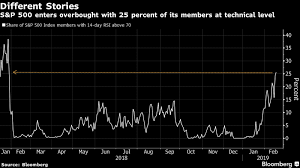
Headline indices of the Japan share market declined on Friday, 22 February 2019, as fresh economic data out of US, Europe and Japan suggested further slowing in global growth. However, fears about a world-wide slowdown were somewhat tempered by reports that U.S. and Chinese negotiators were beginning to outline a deal to end a long-running trade spat. Total 29 out of 33 issues of the TOPIX Sector indices declined, with shares in Marine Transportation, Oil & Coal Products, Securities & Commodities Futures, Mining, Banks, Real Estate, and Iron & Steel issues comprised those that lost the most. Around late afternoon, the 225-issue Nikkei Stock Average declined 62.10 points, or 0.3%, at 21,402.13. The broader Topix index of all First Section issues on the Tokyo Stock Exchange fell 5.21 points, or 0.3%, higher at 1,608.29.
Concerns about slowing global growth were underscored by the release of fresh economic surveys from Europe and Japan that showed manufacturing contracting in February, with export-dependent German manufacturers reporting the worst drop in activity in more than six years amid the US-China trade fight..
U.S. economic data were mixed with durable-goods orders rising lower than expected 1.2% in December. Outside of orders for airplanes and automobiles, orders rose just 0.1%. Meanwhile, a key measure of business investment, known as core orders, slipped 0.7% in December. Manufacturing activity declined in Pennsylvania, Delaware and New Jersey in February, for the first time since May of 2016, according to the Philly Fed manufacturing index. The index fell to a seasonally adjusted reading of -4.1 from 17 in January. U.S. private-sector output growth rose in February at a faster rate than January, according to the Markit PMI composite survey of both the manufacturing and services sectors. The index rose to a seasonally adjusted level of 55.8 in February from 54.4 in January. The Conference Board's leading-economic-indicators index declined 0.1% in January to 111.3, following no change in December. Existing home sales fell 1.2% in January to a seasonally adjusted annual rate of 4.94 million homes, the National Association of Realtors. It marks the third straight month of declines.
U.S. and Chinese negotiators have started to iron out specific details of a possible trade deal. The report said agreements in principle are being drawn up in six key areas: forced technology transfers and cyber theft, intellectual-property rights, services, currency, agriculture and nontariff barriers to trade.
Negotiators have continued talks in Washington this week, following a round of discussions last week in Beijing. President Donald Trump earlier said that a March 1 deadline isn't a “magical” date, which investors took as a sign that tariffs on imports of Chinese goods may not automatically rise next month if progress continues toward a deal.
CURRENCY NEWS: The Japanese yen was little changed in the upper 110 yen zone against the greenback on Friday, largely in line with its levels in New York overnight. The dollar rose to 110.79 yen from 110.63 yen on Tuesday. The dollar was quoted at 110.70-71 yen compared with 110.66-76 yen in New York and 110.76-77 yen on Thursday in Tokyo. The euro, meanwhile, fetched 125.54-58 yen against 125.42-52 yen in New York and 125.54-58 yen in late Thursday afternoon trade in Tokyo.
OFFSHORE MARKET NEWS: US stock market closed down on Thursday, pressured by disappointing readings on the state of the U.S. and European economies which suggest further slowing in global growth. The Dow Jones Industrial Average fell 103.81 points, or 0.4%, to 25,850.63 and the S&P 500 shed 9.82 points, or 0.4%, to 2,774.88, while the Nasdaq Composite Index dropped 29.36 points, or 0.4%, to 7,459.71.
0 thoughts on “Japan Nikkei falls on weak economic data”